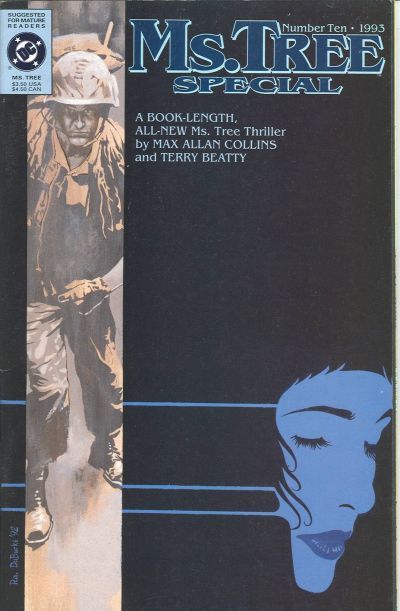The first of Hard Case Crime's Ms. Tree books captured a series of stories from DC's Ms. Tree Quarterly which formed a defacto graphic novel. This second volume gets the rest, stories which are as they say "torn from the headlines". These are provocative stories about provocative subjects, but the treatment is thoughtful and not completely exploitational. Collins and Beatty seem intent on creating stories that strike on sensitive subjects but offering some level of context.
The first titled "The Devil's Punchbowl" deals with Satanism and specifically the craze which seemed to whip through the early 90's about Satan worshippers sacrificing creatures including people. It's a murder tale of course about a young girl who left an unquiet home and found, for a time, some comfort in a cult. When her body turns up, seemingly marked up as if for a ritual, Ms. Tree is hired by her parents to get to bottom of it. Collins is careful to showcase how cults and fear of cults can affect communities.
From the fourth issue comes "Skeleton in the Closet" which deals with gay rights and the struggles inside and outside the gay community to deal with issues such as "Outing". The world has come so far on this issue since this story was published that it seems a bit quaint in places but that's not the fault of Collins and Beatty who try to present a sensitive issue in a sensitive way while at the same time treating the reader to rather intense murder yarn. The characters in this story, even ones we are familiar with have some rough ideas and things to say. An important revelation seals this dandy story.
"Cry Rape" from issue five follows quite closely on after the previous tale and like its predecessor is set on a college campus. Young women who are subjected to sexual harassment and even rape, are the focus here. Like the previous story Ms. Tree's stepson Mike is at the center of his story and his attitudes are complicated by indicative of those of a less enlightened era. Like the story about gay bashing, this one seems somewhat dated, though both are still very much concerns for our modern times. We have not come as far as we imagine in this are for certain.
From issue six we get "Horror Hotel", a splendid whodunnit that smacks of Richard Matheson's Hell House as well many movies of the haunted house variety. Ms. Tree is among a group of folks hired to examine an old mansion presumably haunted by decades of abuse and murder. There are deceptions galore in this fast-paced humdinger of a tale and as to whether ghosts are real, Collins and Beatty seem to leave the door open to that fundamental question. I'm always taken by how Beatty can draw the most gruesome scenes but make then seem so well managed and clean.
Next the volume reaches back to issue twenty-eight of Renegade's Ms. Tree run with "Roger's Story". This sleek black, white and red little gem of betrayal and deceit gives us necessary backstory to understand better the next story in this collection.
The Ms. Tree series at DC ended with issue ten titled at the time a Ms. Tree Special. This story takes Tree Investigations team to Vietnam where a mystery which ties two of our main characters is explored. It's fascinating story, which has a real twist I actually didn't see coming. Most of the time in stories this short a reader can guess the ending or get close, but I confess that Collins and Beatty genuinely surprised me with this one.
The collection closes out with a short story titled "Louise" by Collins which itself was nominated for an Edgar Award. This is a sleek and trim reading experience. The Ms. Tree stories in this collection felt like television episodes put on paper, with neatly defined characters and some twists but rarely confounding. Collins and Beatty stick to the expectations of the hard-nosed detective genre but fill in the spaces with more compassion than one often finds in stories of this kind.
Rip Off









I don't co sider those issues you mention as "dated" so much as being powerful reminders of what the world was like not so very long ago ... and a warning that such times could return, as recent history has sown all too frighteningly here in America.
ReplyDeleteIt does seem to me that the word "dated" is overused, when so often the so-called "dated" movie or book or comic is simply of its time. As such, it's a window into social attitudes & how they can change, sometimes for the better, sometimes for the worse. While time-specific things might reasonably be called "dated" the essence of the human condition doesn't change that much. Why bother with any form of entertainment that's more than a few years old then? Because it still speaks to the human condition today, here & now.
I agree and disagree. You object to the word "dated" but then define it in just the way I intended it. If it's the sense that "dated" indicates that something is old and of no further value, I'd agree, but that's not at all what I mean with this material. These stories still have merit but have to be lensed with the understanding that the issues at hand are understood better these days.
Delete